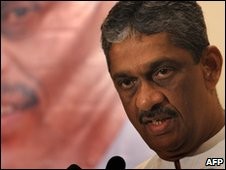COLOMBO, Jan 24, 2010 (AFP) - Sri Lanka's election this week features two men who emerged victorious on the battlefield of a civil war, but have since become bitter political enemies.
President Mahinda Rajapakse, a veteran streetfighter politician who entered parliament aged 24, is taking on his former army chief Sarath Fonseka, a political novice who stepped down last year after being sidelined.

Rajapakse handpicked Fonseka for the top military role soon after he won his first term in 2005 and lauded him as the "best army commander in the world" last year in the afterglow of their victory over Tamil Tiger rebels.
But their friendship soured over who should take the most credit for winning the conflict amid suspicion that Fonseka was becoming too powerful and might even stage a coup.
In a measure of the bad blood between them today, Rajapakse was recently asked if he had made any poor choices during his first four years in charge, to which he replied: "Choosing my army commander was one of them."
The relationship took a turn for the worse when local media reported Fonseka's horoscope indicated he was powerful and would one day be president, making waves in a country where such readings are taken more seriously than opinion polls.
Fonseka, who like Rajapakse faces pressure from the UN to submit to a war crimes investigation over the conduct of the fight against the Tigers, is a lover of boxing and swimming and served as an infantry officer for 40 years.
In April 2006, he survived an assassination attempt when Tiger rebels targeted him with a suicide bomb, a tactic they used with deadly precision on a number of occasions during their fight against the Colombo government.
Though seriously wounded, Fonseka bounced back to unleash Sri Lanka's biggest ever military onslaught, which wiped out the Tigers, but may also have killed 7,000 civilians in its latter stages, according to UN estimates.
Fonseka, 59, still carries the scars from the suicide blast and proudly shows them off in a topless picture revealing his darkened tissue used in campaign literature to bolster his image.
His supporters see in him an honest leader who would bring discipline to the country, while detractors see a future military dictator who is trying to claim too much personal credit for the war victory.
He says he has become a politician only reluctantly.
"I was not interested in getting into politics. All I wanted to do was retire and be with my family," Fonseka told AFP soon after entering the battle for ballots. "I won the war, but the president failed to win the peace."
He frequently accuses his charismatic former boss of nepotism and corruption.
Rajapakse's immediate family and close relatives are in key positions, charged with control of defence, ports and the reconstruction of war-ravaged areas.
"They say 'Rajapakse brothers' run the country, but the truth is that my brothers have delivered (results)," the 64-year-old president told reporters during a recent meeting.
His younger brother Gotabhaya is the top official running the defence ministry, another is minister of ports while a third manages rebuilding in the former war zones.
Rajapakse became the villain for international rights groups after a dozen journalists were killed or "disappeared" since he took office in 2005 although he was a leading campaigner for press freedom when he was in opposition,
Addressing critics who argued that children of poor farmers were enlisting in the military while the upper middle classes were insulated from the horrors of the war, Rajapakse saw his second son Yoshita, joining the navy as a cadet.
His public relations with the electorate are often spontaneous. Despite fears of attacks, Rajapakse thrives on carrying babies and patting party workers on the back and attending public rallies.
In a brief movie career, he took on the role of an army general in the 1993 Sinhalese film, Nomiyana Minusun -- the Immortals.
Both presidential candidates had their schooling in Sri Lanka, uncommon in a country where the political elite are generally educated abroad.
Fonseka has no political credentials and frequently appears uncomfortable out of uniform, particularly when facing the media. His public speaking is in stark contrast to Rajapakse's fiery rhetoric.
He won a US "Green Card" lottery which gives him residency rights in the United States. His two daughters aged 28 and 23 are studying in the central US city of Oklahoma.
























